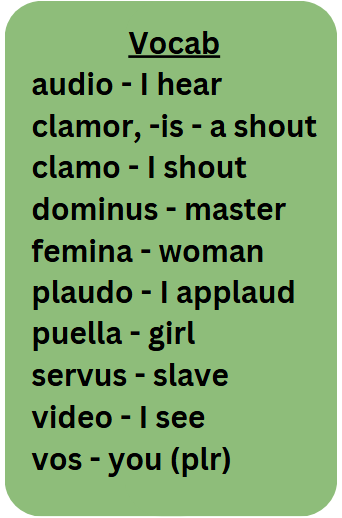The Latin Imperfect
My Personal Favourite Tense
The Latin imperfect tense is one of my very favourite verb tenses. That's because it's super easy to spot, and I'm going to teach you how right now.
Hint: there is a reason this blog is called bambasbat!
Spotting the Imperfect Tense
Look at these two sentences:
puella in foro ambulat.
The girl is walking in the forum.
puella in foro ambulabat.
The girl was walking in the forum.
What's changed? In the first sentence, the girl is walking. That's in the present tense. In the second sentence, the girl was walking. That's the imperfect tense.
Singular Endings
she is walking: ambulat
she was walking: ambulabat
That's the key part of the imperfect, the -ba-. This is how you always spot the imperfect tense. It doesn't matter who is doing the verb or what verb it is. The imperfect tense will always have -ba-.
ambulabat is the third person singular, the “he, she, it” form of the verb. But I'm going to show you just how easy it is to spot the imperfect tense for all different person endings.
you are walking: ambulas
you were walking: ambulabas
In the second sentence we have the -ba- again. That's all that has changed. I've just added that in front of the second person singular ending -s.
I am walking: ambulo
I was walking: ambulabam
Now this one is slightly different, however, I still have my -ba- for the second verb. All that's changed from the others is that ambulabao doesn't work in Latin. They don't like the sound of it. So instead of an -o on the end, they change it to an -m. This is the first person singular ending.
So I've now got -bam, -bas, and -bat. They're my singulars: “I was”, “You were”, “He, she, it was” endings.
-bam: ambulabam - “I was walking”
-bas: ambulabas - “you were walking”
-bat: ambulabat - “he was walking”
Is this getting repetitive?
Good.
Learn it.
Plural Endings
Here are the imperfect plural endings.
-bamus: ambulabamus - we were walking
-batis: ambulabatis - you plural were walking
-bant: ambulabant - they were walking.
-ba- -ba- -ba-. All the bas! Be like a little sheep and repeat these endings to yourself.
-ba- is how you spot the imperfect. It is translated as “was” or “were” doing X verb.
Spot the Difference
puer in via currebat
pueri in via currebant
Can you spot the difference between them?
The first sentence is singular, -bat - “he/she was”. The second is -bant, the third person plural ending (“they were”).
Practise Sentences
Have a go at these yourself. I've got vocabulary to help you. The answers are below so scroll only when ready to find out the translations!
feminae servos videbant
regem plaudebamus
vos puellas clamabatis
dominus clamorem audiebat
Read on when you’re ready to find out the answers!
Answers
feminae servos videbant.
feminae is a nominative plural noun. It means “the women”.
Even if I'm not sure about that, servos, “the slaves”, can't be in charge because that's accusative plural, so can’t be doing the verb.
videbant is my verb. I have video in the vocab list. That means “I see” and it's the present tense. But in my sentence, I have videbant which has the -ba-, the imperfect signifier. So videbant means “they were seeing”
“The women were seeing the slaves.”
regem plaudebamus.
It helps to look at the verb first. plaudebamus has a “we” ending, -mus the first person plural. Now plaudo from the vocab list means “I applaud”. So here I'm going to change it to we applaud because of the -mus. But I've still got -ba- in the middle of that word to translate. So plaudebamus means “we were applauding”. Who were we applauding? regem, “the king”, is accusative.
“We were applauding the king.”
vos puellas clamabatis.
I've got help here with vos, which means “you” plural.
clamabatis is the verb, and the -tis ending also means “you” plural. I know it's “were doing something” because it also has the -ba-, so it's imperfect tense. Then I look in my vocab. clamo means “I shout”. So clamabatis means “you were shouting” or “you were calling”.
puellas is accusative plural, it’s a first declension noun, so they are the object of the verb.
“You were shouting the girls.”
dominus clamorem audiebat.
audiebat ends with -t, so it's a third person singular verb. It also has the -ba- so I know it's imperfect. audio from the vocab list means “I hear”. If you put all that together you get “he was hearing”, or “he was listening to”
dominus is nominative singular, and it matches the -t ending of the verb.
Now we need an object for him to hear - clamorem is a noun this time, not the verb from the 3rd sentence. It is the 3rd declension accusative singular, “the shout”.
“The master was hearing the shout.”
And that is the imperfect tense! It's the easiest tense. I absolutely love it, and I hope you see why. You can absolutely rattle through learning it. It's just -ba- and your normal person endings.
So yes, I named my website and YouTube channel after the Imperfect Tense in Latin.
To be fair, I never claimed to be cool.
If you're struggling with any of your Latin verbs, you can download my Complete Reference Guide to Latin verbs here. It's a free PDF, and it'll really help you with all your Latin verb endings!
Thanks so much for joining me, and I'll see you next time on bambasbat.



